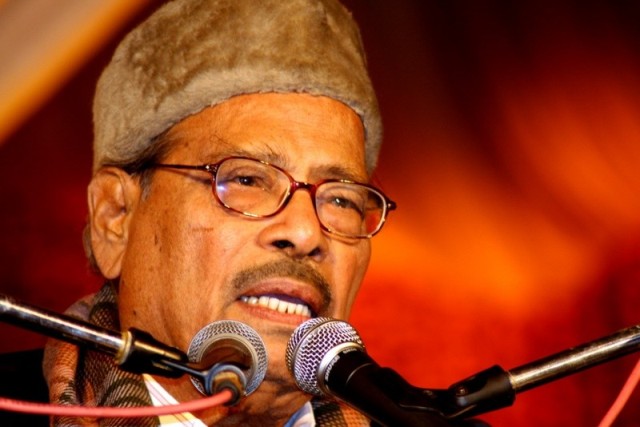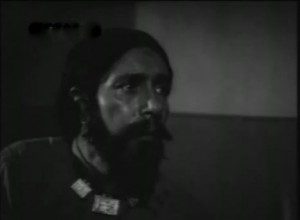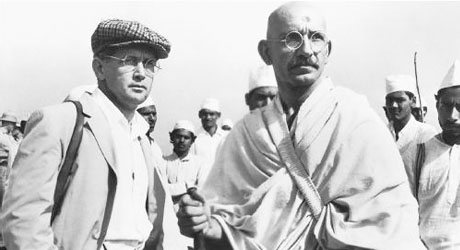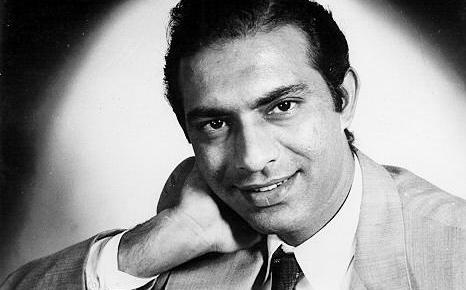This post has been on the back burner for many months. Every time I listen to a Manna Dey song, I tell myself I need to write a post on one of my favourite singers. For some reason or the other, I put it off for later. Perhaps now is the time to write about a singer whose versatility was a byword in the industry, even though, in my opinion, he was never given his complete due as a singer.
Born Prabodh Chandra Dey on 1 May 1919, he made his name as one of the stalwarts of the playback industry as Manna Dey. Classically trained, his earliest gurus were his uncle Krishna Chandra Dey (KC Dey) and Ustad Dabir Khan. His foray into the Hindi film industry was under the aegis of his uncle KC Dey; he worked as an assistant music director, assisting his uncle first, and then SD Burman. It was his uncle who gave him his first break as a singer in 1943; the 24-year-old Manna Dey’s first recorded song was a duet Jaago aayi Usha with singer-actress Suraiyya, for the film Tamanna. Between 1943 and 1950, Manna Dey continued singing and working as an assistant music director for other composers, eventually setting up independently.
However, it was Upar gagan Vishal for Nitin Bose’s Mashaal, courtesy SD Burman, that was to propel him into the big league. When asked about this long journey towards success in an interview, Mannada had this to say: The other singers who were in the running were better than me, definitely. Oh yes, they were better singers than me. Even at the height of my career, I would say Mohammad Rafi was a better singer than me. He was such a great singer and I used to listen to him, awestruck. His rendering of certain things – I could never do it.
His respect for his contemporaries was rooted in his own sense of self. Yet, there was sometimes a whiff of sadness when he recollects that most of his early songs were picturized on old men or beggars. He soon became the voice of the character actors. As a young man, he too wanted to taste success as a popular singer. Frustrated, he even thought of leaving Bombay.
Well-versed in classical music – Manna Dey had been keeping up with his lessons in Hindustani classical music at the same time, learning from Ustad Aman Ali Khan and Ustad Abdul Rahman Khan – he became synonymous with classical songs, which was both a blessing and a curse. With its usual propensity to typecast someone, the Hindi film industry relegated him to singing classical numbers. Of course, he sang them well, probably better than anyone of his contemporaries at the time. Yet, it unfairly limited the singer who could sing love ballads with the best of them.
As his songs prove, there was more to Mannada than just being a good classical singer. He had made a name for himself in the Bengali film industry, and it is our good fortune that he chose to continue to sing for Hindi films. What a voice he had, warm and deep and mellow, so full of emotion that one felt as well as heard his songs! (A long-time reader, Samir, is wont to pair singers’ voices with good liquor; in the same vein, I picture Manna Dey’s voice as a goblet of warm Cognac.)
I find it difficult to choose just a handful of my favorite songs from this gentle singer’s long and varied career, especially when my ‘favourite Manna Dey songs’ vary with my mood. Here then, are a few of my present favorites; these songs, in no particular order, will always find a place in my list of favourite songs of all time.
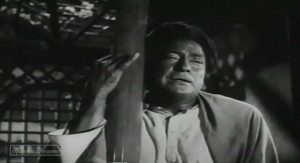 1) Poocho na kaise ye rain bitayi
1) Poocho na kaise ye rain bitayi
Meri Soorat Teri Aankhein (1983)
Music: SD Burman
Lyrics: Shailendra
Based on Raag Ahir Bhairav, Poocho na kaise ye rain bitayi is one of Manna Dey’s classical numbers that has remained a firm favorite over the years. SD based this composition on Aruno-kaanti ke go jogi bhikaari, a Bengali composition in Raag Bhairavi by Kazi Nazrul Islam. I love the emotion in Manna Dey’s voice, its anguish bound and tightly controlled as he sings for a character who knows what rejection is. (One of my readers, Mr. N Venkatraman points out that this is not correct, and that SD Burman in one of his interviews in Vividh Bharati attributed the composition to a traditional bandish in Raag Ahir Bhairav by Ustaad Mushtaq Hussein Khan.)
Kabuliwala (1961)
Music: Salil Choudhary
Lyrics: Prem Dhawan
My list of ‘favorite’ songs changes with the seasons, with my moods, from day to day, from time to time, and so I rarely say that a particular song is my favourite Hindi film song. Yet, this one song is always there in the background, it’s soft melody, and evocative lyrics calling to something deep within me. On the face of it, not a ‘patriotic’ song, is it? Yet, every line reflects a man’s love for his land and his longing for the country of his birth. Salilda’s music, just barely there, and his use of the rubab sets the mood nicely. Mannada’s mellifluous voice had such pathos it is difficult to hold tears back. This song will always be among my favorite numbers, both for its simple yet meaningful lyrics and the minimal instrumentation which allowed Mannada’s voice to soar with an immigrant’s yearning for the motherland.
Hum jahan paide huye
Us jagah hi nikle dam
Tujh pe dil qurbaan
Maybe it is because I live so far from the land of my birth that this song tugs at my heartstrings. It will always be the most definitive patriotic song for me. Ever.
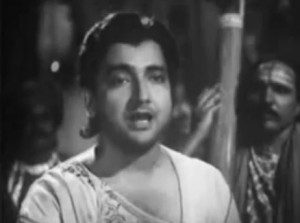 3) Sur na saje
3) Sur na saje
Basant Bahar (1956)
Music: Shankar-Jaikishen
Lyrics: Shailendra
For a change, Manna Dey is singing for the hero. Much like Baiju Bawra, Basant Bahar also told the tale of a singer (Bharat Bhushan) who has to face immense hurdles on his path to become court singer. Based on Hamsa Geete, a Kannada novel by Ta-ra-su (Talaku Ramaswamy Subba Rao), the story was said to be the real-life story of 18th-century Carnatic musician Bhairavi Subbiah. With a fantastic score by Shankar-Jaikishen, the music of Basant Bahar has definitely earned its place among the classics. Strangely enough, Manna Dey got to sing four of the nine songs, while Mohammed Rafi had to be content with just two.
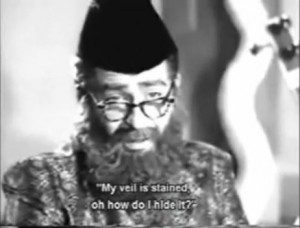 4) Laaga chunri mein daag
4) Laaga chunri mein daag
Dil Hi To Hai
Music: Roshan
Lyrics: Sahir Ludhianvi
Manna Dey brought all his classical adas and harkats to use in this semi-classical number based on Raag Bhairav by Roshan. Mannada‘s classical training allowed him to give full rein to the nuances and flourishes in the long sargam that end this piece. Picturised on Raj Kapoor (and Padmini Priyadarshini as the dancer), this song brought to the fore the actor-directors acting prowess and underlined the fact that Mukesh may have been Raj Kapoor’s soul but Manna Dey’s voice could, and did, suit the showman admirably.
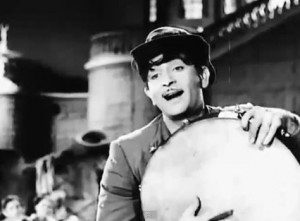 5) Dil ka haal suno dilwala
5) Dil ka haal suno dilwala
Shree 420 (1955)
Music: Shankar-Jaikishan
Lyrics: Shailendra
From semi-classical to folk. Manna Dey sang this cynical, anti-establishment song with his usual panache, subtly reminding listeners (and hopefully, composers) that he was perfectly capable of breaking out of stereotypes. This is a cheerful song, the humor underlining the harsh truths in the lyrics. Shailendra’s words poke gentle fun at society’s double standards. Anyone can be picked up and taken to prison because he looks like a criminal; however, once they know he is the inspector’s brother-in-law, they are as eager to release him as they were to arrest him in the first place. Once again, it is Manna Dey singing for Raj Kapoor; Mannada could not leverage the success of this film and the song to form a partnership with Raj Kapoor. Unfortunately for him, he had commitments in Bengal at the time that he could not give up to move to Bombay, and by the time he did, the momentum had passed.
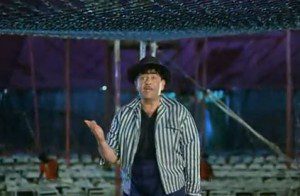 6) Ae bhai zara dekh ke chalo
6) Ae bhai zara dekh ke chalo
Mera Naam Joker (1970)
Music: Shankar-Jaikishen
Lyrics: Neeraj
It is interesting that this is the third Manna Dey-RK combination in the list. Goes to prove that it was not only Mukesh who could sing for Raj Kapoor! Another philosophical number, Ae bhai zara dekh ke chalo, appearing as two parts in two different sequences (the rehearsal and the show) went on to win the Filmfare Best Playback Singer (Male) award for Manna Dey, who imbued it with just the right sobriety and pathos. Mera Naam Joker may have been a commercial disaster, breaking Raj Kapoor’s heart, but its songs were deservedly successful. This song also won Manna Dey his second National Award.
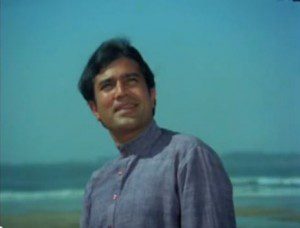 7) Zindagi kaisi hai paheli haaye
7) Zindagi kaisi hai paheli haaye
Anand (1970)
Music: Salil Choudhary
Lyrics: Yogesh
This was the single Manna Dey solo in the film. With Manna Dey’s luck, this may also have remained a background song (Hrishidaintended to use it during the credits) if Rajesh Khanna, who heard the number, had not persuaded his director to picturise it on him. The rest, as they say, is history. Yogesh’s lyrics (he wrote two of the four songs in this film, the other being Kahin door jab din dhal jaaye sung by Mukesh), are as philosophical as Anand’s (Rajesh Khanna in the titular role) attitude, which is as light as the balloons he lets soar into the sky. Juxtaposed with the distress that Dr. Bhaskar (a.k.a Babu Moshai / Amitabh Bachchan) and Renu (Sumita Sanyal) are unable to hide, the song made more of an impact than otherwise. Salilda‘s music, ebbing and soaring, matched Manna Dey’s rendition, happy-go-lucky, with a hint of sorrow. Beautiful.
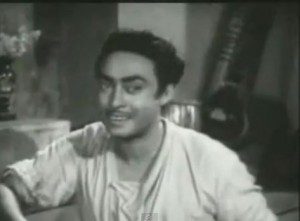 8) Kaun aaya mere man ke dwaare
8) Kaun aaya mere man ke dwaare
Dekh Kabira Roya (1957)
Music: Madan Mohan
Lyrics: Rajinder Kishen
Sit back, relax and soak in the pure, inexplicable joy of falling in love. The film may have consisted of the second rung of actors, but the score was vintage Madan Mohan. Like Manna Dey, Madan Mohan did not get the recognition he deserved when he lived. Most of the films he composed for were box-office duds or did not see the light of day. Yet, his music retained a standard that he set for himself, and we are fortunate to be able to explore the variety of his output. Dekh Kabira Roya, for instance, had (apart from this song), the beautiful Humse aaya na gaya, the poignant Meri veena tum bin roye, and the ebullient Hum panchchi mastane, amongst others. Picturised on Anoop Kumar (who plays a classical musician), Manna Dey sang this number with characteristic ease. (Try singing this yourself and you will realize how complex the tune is, and how difficult it is to sing.)
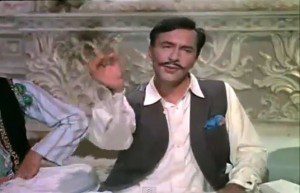 9) Ae meri zohra jabeen
9) Ae meri zohra jabeen
Waqt (1965)
Music: Ravi
Lyrics: Sahir Ludhianvi
I first listed this in my post on qawwalis. It’s playful affection and the more mature romance that it talks about to make it one of my perpetual favorites. Manna Dey’s voice, teasing and loving simultaneously, found its reflection in the mischief in Balraj Sahni’s eyes – he made it quite evident that he wasn’t thinking of mere companionship when he was oh-so-publicly courting his wife. In one sense, this was a breakthrough song – ‘old’ men and women are not supposed to be in love, and equally obviously, once they have children, they are not supposed to vocalize that love. The picturization was perfect – an unabashed husband, an embarrassed wife, and the teasing of the assembled friends.
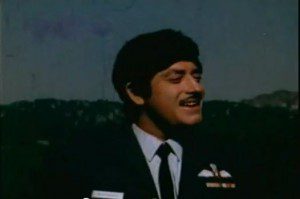 10) Har taraf ab yehi afsaane hai
10) Har taraf ab yehi afsaane hai
Hindustan ki Kasam (1974)
Music: Madan Mohan
Lyrics: Kaifi Azmi
For a change, Manna Dey was singing for the hero, Raj Kumar, in this film by Chetan Anand. Based on Operation Cactus Lily in the 1971 Indo-Pak war, and dealt with the role of the IAF in the conflict. Chetan Anand reprised his Haqeeqat team of Madan Mohan and Kaifi Azmi, and Manna Dey got to sing this quiet romantic ballad as also the title song of the film (with Mohammed Rafi).
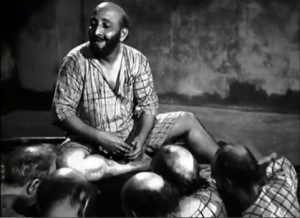 11) Lapak jhapak tu aa re badarwa
11) Lapak jhapak tu aa re badarwa
Boot Polish (1953)
Music: Shankar-Jaikishen
Lyrics: Shailendra
As was usually the case, the classical and semi-classical numbers usually came to Manna Dey. As usual again, the song was picturized on a character actor – David. A light-hearted number that provided the much-needed comic relief in a poignant tale of two children who have fallen on bad times, and parodied the usual exhortations for rains, Manna Dey came up trumps.
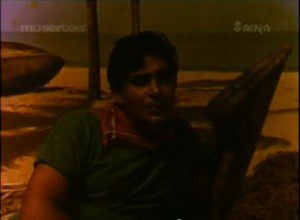 12) Maanasa maine varu
12) Maanasa maine varu
Chemmeen (1965)
Music: Salil Choudhary
Lyrics: Vayalar Rama Varma
Oh, I know this is not a Hindi film song, but I couldn’t resist adding this to the list. Because when you list Manna Dey’s best songs in all languages, I wager that you cannot ignore this classic. Coupled with the fact that his enunciation is almost perfect. The nit-pickety Malayalis who famously repudiated Lata Mangeshkar’s atrocious diction in Kathali chen kathali (another Salil Choudhary composition) in Nellu (1974) (no complaints about her singing, however), had earlier embraced Mannada‘s rendition of the soulful love plant in a landmark film. Perhaps the fact that Manna Dey’s wife was a Malayali had something to do with his near-perfect diction while singing.
I limited myself to Manna Dey’s solos in this post because it was so difficult to do justice to the great singer’s solos in just one post that it would have been well-nigh impossible to include the duets and strive to keep a balance. Hence, part 2 of this post will have my favorite Manna Dey duets.
Read The Part 2
Written By: – Anuradha Warrier, is a writer, editor, film and music buff. She writes for pleasure, edits for a living, and indulges in watching films, listening to music, and writing about both on her blog Conversations Over Chai as and when time permits.
DISCLAIMER: The views expressed are solely of the author and Bollywoodirect.com do not necessarily subscribe to it. Bollywoodirect.com shall not be responsible for any damage caused to any person/organization directly or indirectly.

